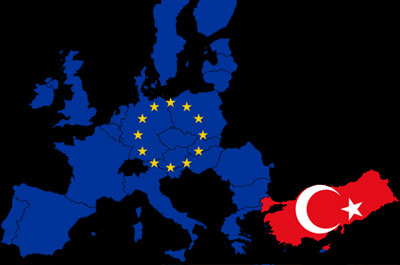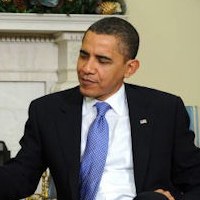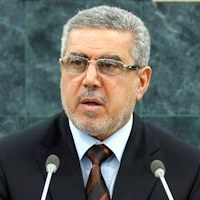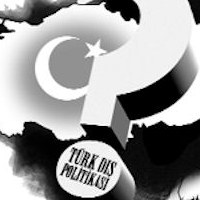![]()
Wed, Nov 7, 2012 | by Gareth Jenkins
This article was first published in the Turkey Analyst, vol. 5 no. 21 (www.turkeyanalyst.org), a biweekly publication of the Central Asia-Caucasus Institute & Silk Road Studies Program Joint Center. © Central Asia-Caucasus Institute & Silk Road Studies Program Joint Center, 2012.
On 10 October 2012 , the European Commission issued its most critical report on Turkey’s progress towards meeting the criteria for EU membership since accession negotiations were formally inaugurated in 2005. Turkey’s ruling Justice and Development Party (AKP) responded by accusing the EU of prejudice and double standards, while reiterating Ankara’s desire for EU membership. In reality, flushed with self-confidence and dreams of regional hegemony, the AKP has long since lost interest in accession. Nor does anyone in Brussels regard Turkish membership as anything more than a hypothetical possibility in the foreseeable future. Yet neither side is willing to admit publicly that Turkey’s candidacy is moribund, much less call a halt to the accession negotiations.
Background
Most of the leading members of the AKP began their political careers in the string of Islamist parties led by Necmettin Erbakan who was an outspoken opponent of EU membership, arguing that Turkey should instead focus on forming closer ties with other Muslim countries. In 1994, Ahmet Davutoğlu, Turkey’s foreign minister, published a book called Civilizational Transformation and the Muslim World, in which he called for the recreation of the Caliphate and the unification of all Muslims in a single polity distinct from what he termed “Western civilization”.
At the time that Turkey was first named as an official candidate for EU accession at the EU summit in Helsinki in December 1999, the country was ruled by a fractious tripartite coalition that inaugurated a program of democratizing political reforms to try to qualify for the opening of full accession negotiations. Contrary to the expectations of some of its critics, the AKP not only continued but accelerated the EU reform process, introducing a series of legislative changes which enabled Turkey to open official accession negotiations in October 2005. However, once the talks had started, the domestic reform process began to lose momentum and the AKP began to prevaricate about implementing the further changes required for full membership. Since October 2005, 13 of the 33 chapters of the accession that were due to be negotiated have been opened and just one has been closed. No new chapters have been opened since June 2010, the first time that any candidate country has gone more than six months without opening at least one chapter. In July 2012, Turkey suspended all contacts with the EU for the six month presidency of the Republic of Cyprus, which Ankara refuses to recognize.
The AKP has blamed the impasse on racial and religious prejudice in the EU, citing a series of statements by politicians in France and Germany calling for Turkey to be offered a “privileged partnership” instead of full membership. The AKP’s domestic critics accuse it of instrumentalizing the accession process, citing the selectivity of many of the AKP’s reforms — such as measures to curb the already fading political power of the fiercely secularist Turkish military while failing to introduce laws to guarantee equal rights for Turkey’s large heterodox Alevi religious community. EU officials complain that, in addition to failing to implement the necessary domestic reforms, the AKP has refused to extend its 1996 Customs Union with the EU to the Republic of Cyprus, despite signing an explicit commitment to do so in July 2005. In response, EU member states have suspended 17 of the chapters of the accession process, meaning that — regardless of the domestic reform process — Turkish membership is now effectively dependent on a resolution of the Cyprus problem. The prospects for a reunification of the divided island currently appear slim.
There is an element of truth in the claims of the EU, the AKP and its domestic critics. The opening of negotiations in 2005 did appear to galvanize those in the EU who were — some for practical reasons, others out of racial and religious prejudice — opposed to Turkish accession regardless of whether it eventually met the criteria for accession. Meanwhile, the AKP has manifestly failed to implement the required domestic reforms or honored its commitment to extend the Customs Union to the Republic of Cyprus. But, initially at least, the AKP also appears to have misunderstood the nature of EU membership, believing that what it regarded as Turkish exceptionalism would enable it to enjoy all of the benefits of accession without having to fulfill some of the obligations. For example, even when the reform process still had momentum in 2003 and 2004, AKP officials often condemned EU calls for additional changes on the grounds that the EU was “trying to interfere in Turkey’s internal affairs” and “violating Turkey’s sovereignty”. In fact, accepting the primacy of the body of EU legislation — known as the acquis communautaire — over domestic law is one of the prerequisites for membership of the union.
Implications
In recent years, the AKP’s frustration, bewilderment and resentment of the EU has been accompanied by a sense that Turkey no longer needs membership. AKP officials have had no hesitation in gloatingly comparing the recession in Europe with the continued strong performance of the Turkish economy. More dangerously, after a decade of economic growth and three successive election victories, AKP ministers — particularly Prime Minister Recep Tayyip Erdoğan — often appear intoxicated by their own success. In common with Erbakan’s parties, the AKP has taken to identifying itself as part of a community defined by religious belief rather than the shared values which, in theory at least, unite the members of the EU. While Davutoğlu has energetically tried to assert Turkey as the preeminent power in the Middle East, in apposition — and often seemingly in opposition — to the EU and the U.S.
The AKP’s thinly disguised — if invariably denied — neo-Ottoman ambitions have been accompanied by a surge in Ottoman nostalgia in Turkish society, particularly amongst the new conservative middle class who have flourished under the AKP.
The AKP’s almost hubristic self-confidence seems to have been unaffected by indications that — much as they admire its apparent prosperity and outspoken criticism of Israel — the Muslims of the Middle East have little desire to submit to Turkish hegemony. More insidiously, it has reinforced deep-rooted suspicions of the EU’s motives and resulted in a tendency to view any criticism by Brussels as being the product of envy or a nefarious ploy to undermine the country’s otherwise inexorable rise to regional preeminence. In the 94-page Progress Report released on 10 October 2012, the normally cautious European Commission made it clear that in several areas Turkey was not only failing to make sufficient progress towards EU standards but was regressing, particularly in terms of democratization, political accountability, independence of the judiciary and freedom of expression.
Turkish EU Minister Egemen Bağış responded to the criticisms in the Progress Report by accusing the European Commission of bias and inventing pretexts to try to delay Turkish accession. “There is no country that is enacting EU reforms any faster,” Bağış claimed. “It is the EU which has slowed down. The EU just can’t digest Turkey. It cannot catch up with Turkey’s speed.”
Burhan Kuzu, the AKP chair of the Parliamentary Commission responsible for formulating a new constitution for Turkey (a document which should presumably comply with the acquis communautaire), was more forthright. In an appearance on national television, Kuzu described the Progress Report as a “dirty report prepared by Southern Cyprus” and threw a copy on the floor, explaining that the studio did not have a garbage bin.
On October 31, 2012, during a visit to Germany, Erdoğan was similarly dismissive of the concerns raised by the report, warning the EU that it would “lose” Turkey if it did not grant the country membership by 2023, the 100th anniversary of the modern republic’s foundation. Such rhetoric is not mere bravado. Most members of the AKP government sincerely believe that the EU now needs Turkey more than Turkey needs the EU. As a result, not only is the EU losing leverage in terms of pressure to reform existing legislation, but there are increasing signs that the acquis communautaire is no longer regarded as a reference point for the formulation of new laws. On November 3, 2012, during a party meeting in Kızılcahamam outside Ankara, Erdoğan even appeared to advocate the reintroduction of capital punishment, something that is clearly incompatible with EU accession. Ironically, a disagreement over the abolition of the death penalty in order to meet the criteria for EU membership was one of the main reasons for the collapse of the tripartite coalition government in 2002.
Conclusions
There is little doubt that, regardless of any questions about its motivation or the degree to which it had internalized the values inherent in the process, the AKP’s desire to secure a date for the opening of EU accession negotiations was the main driving force behind the democratizing reforms of its first years in power — including curbing the political influence of the military, easing restrictions on Kurdish language rights and improving freedom of expression. Since the AKP lost interest in the accession process, democratization has not only stalled but gone into reverse.
The prospect of EU accession also played a major role in the strong performance of the economy under the AKP, underpinning an unprecedented inflow of foreign investment and, through reassuring the financial markets, helping to stabilize interest and exchange rates and fuelling the credit boom that has driven the domestic demand that has produced the impressive growth figures of the last decade.
Concerns about the possible impact on foreign investor confidence is one of the main reasons that the AKP is reluctant to declare publicly what party officials have no hesitation in admitting in private, namely that the government no longer expects or wants to join the EU. Nor is there any pressure on the AKP from the Turkish public. The possibility of EU accession is rarely discussed in the media. Opinion polls suggest that public support for membership has now declined to less than 50 per cent and is still falling.
Nevertheless, there are already worrying indications that the abandonment of Turkey’s EU aspirations could have severe repercussions. The Turkish political system has always lacked checks and balances. Under the previous regime, the main constraint on elected governments was fear of the military. During the AKP’s first years in power this was replaced by the liberalizing impetus produced by the fear of jeopardizing hopes of opening accession negotiations. The demise of Turkey’s EU aspirations has removed a force not only for democratic change but also for political stability. There is a real concern that, unless the EU process can somehow be revived, Turkey will become politically more unstable and sink deeper into an already growing authoritarianism.
Gareth Jenkins, a Nonresident Senior Fellow with the CACI & SRSP Joint Center, is an Istanbul-based writer and specialist of Turkish Affairs.



 RSS
RSS













Latest Comments
Hello Mike, Thank you for your positive feedback to the article. I felt there wasn’t too much critical analysis of ...
Thanks for this considered and well constructed article. A follow up article on the manner in which the editorial contro...
THE CLUELESSNESS OF CLAIMING THAT OBAMA'S MIDDLE EAST POLICIES WERE A FAILURE CANNOT BE FURTHER FROM THE TRUTH, WHAT THE...
As long as Obama is the president of the usa do not trust the us government......
Thank you for an good read....